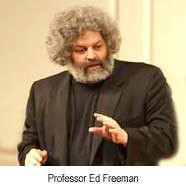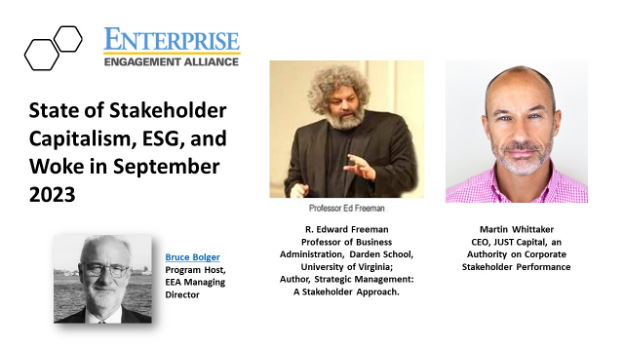EEA Live Show, Sept. 27 at 11 AM ET—State of Stakeholder Capitalism, ESG, and Anti-Woke in September 2023
 In March 2022, the Enterprise Engagement Alliance featured a YouTube show with three leaders in the Stakeholder Capitalism and related ESG (Environmental, Social, Governance) to assess the state of the movement. Now 18 months later, we bring back two of the three panelists to discuss the current state.
In March 2022, the Enterprise Engagement Alliance featured a YouTube show with three leaders in the Stakeholder Capitalism and related ESG (Environmental, Social, Governance) to assess the state of the movement. Now 18 months later, we bring back two of the three panelists to discuss the current state.Issues Addressed in the Program
Summary of the May 2022 Program
Summary of remarks last year
How much has changed in the state of stakeholder capitalism and the related issues of ESG over the last 18 months since the beginning of the “anti-woke” campaign? To find out, we turned to R. Edward Freeman, author of the seminal 1984 book, Strategic Management--A Stakeholder Approach, and
Martin Whittaker, CEO of JUST Capital, an authority on corporate stakeholder performance. They were panelists on the March 2022 program.
To participate in the conversation, click here to register to the live event Sept. 27 at 11 am-noon. Otherwise, the show will be available shortly after on the EEA’s YouTube channel and Stakeholder Capitalism podcast channel.
 Last year, the panelists agreed that in terms of awareness, the concepts of stakeholder capitalism and ESG had entered the later innings of the game in baseball parlance but remained early stage in terms of practical implementation, due largely to lack of expertise. As outlined in the summary of last year’s program below, all agreed that the anti-ESG movement was unlikely to succeed in the long run because it is based on a fabricated definition unrelated to the roots, theory, and practice of stakeholder capitalism and ESG. The show will explore the impact of the anti-ESG efforts.
Last year, the panelists agreed that in terms of awareness, the concepts of stakeholder capitalism and ESG had entered the later innings of the game in baseball parlance but remained early stage in terms of practical implementation, due largely to lack of expertise. As outlined in the summary of last year’s program below, all agreed that the anti-ESG movement was unlikely to succeed in the long run because it is based on a fabricated definition unrelated to the roots, theory, and practice of stakeholder capitalism and ESG. The show will explore the impact of the anti-ESG efforts.According to the Enterprise Engagement Alliance, stakeholder capitalism is defined as a strategy to enhance returns for investors only by creating value for customers, employees, supply chain partners, communities and the environment.
Issues Addressed in the Program
1. What is the status of the anti-woke movement in terms of stakeholder capitalism and ESG implementation in the US and overseas? What is the genesis of the woke argument?
2. Do business leaders or the public generally understand the distinction between the practical definition based on the roots of the field and the definition that was created by the left wing and anti-woke movement after the Business Roundtable announced its new charter of the organization in 2019.
3. Last year, the panel agreed that awareness had entered the later innings; do they still believe that?
4. There was also general agreement that the major impediment to progress was expertise. Has there been any improvement in that domain?
5. What is the state of academic emphasis on the S of ESG and stakeholder thinking? Are there signs of greater interest in college campuses as there was on the E of ESG when the “sustainability” movement took hold?
6. What is the potential impact of the European Union Corporate Sustainability Reporting Directive, given the impact of the EU on privacy practices and now even smart phone chargers. The law largely mirrors the stakeholder framework in R. Edward Freeman’s 1984 book and requires audited corporate sustainability reporting by companies with over 250 employees in the European Union.
Summary of the May 2022 Program
For reference, here’s a recap of last year’s show.
By this time, the subject of stakeholder capitalism has become the topic of articles in leading media, including the Wall Street Journal, New York Times, Fortune, Fast Company, Financial Times, and National Review, without a clear definition, with opposition coming from the right and the left.
Summary of remarks last year
*The proper definition is based on the actual practice and evolution of Stakeholder Capitalism management over the last three decades, not the recent politicized version. The Enterprise Engagement Alliance definition reads: It creates returns for shareholders only by creating value for customers, employees, supply chain and distribution partners, communities, and the environment. Freeman says he has been attacked by the left and the right.
*The definition being used by the left and right appears to be a partisan effort to on the one hand question the ability of capitalism to address societal needs and on the other views it as a threat to property rights forbidding companies from pursuing profit for the primary benefit of shareholders. Wayne Winegarden, author of recent National Review article, “The Empty Case for Stakeholder Capitalism and ESG Investors,” defines it as: “Companies have an obligation to serve the interests of all stakeholders, beyond just employees, customers, and shareholders, to involve the broader community of diverse individuals who have no direct connection to the company’s interests.”
*Big risks to the movement include the partisan polarization seeking to confuse stakeholder capitalism with other agendas. Another risk includes exaggerated claims by ESG advocates, rather than recognizing that while effective people management is a path to better returns, other factors come into play as well.
*Despite the challenges to stakeholder capitalism, there is no turning back because of the economic benefits, reduced risks, and pressures coming from all stakeholders.
*While the level of awareness is rapidly increasing because of the publicity in leading media, we are in the early stages of awareness or figuring out how to implement stakeholder capitalism at the practical level. It is taught almost nowhere in schools."
ESM Is Published by The EEA: Your Source for Effective Stakeholder Management, Engagement, and Reporting
Through education, media, business development, advisory services, and outreach, the Enterprise Engagement Alliance supports professionals, educators, organizations, asset managers, investors, and engagement solution providers seeking a competitive advantage by profiting from a strategic and systematic approach to stakeholder engagement across the enterprise. Click here for details on all EEA and ESM media services.
1. Professional Education on Stakeholder Management and Total Rewards
- Become part of the EEA as an individual, corporation, or solution provider to gain access to valuable learning, thought leadership, and marketing resources to master stakeholder management and reporting.
- The only education and certification program focusing on Stakeholder Engagement and Human Capital metrics and reporting, featuring nine members-only training videos that provide preparation for certification in Enterprise Engagement.
- EEA books: Paid EEA participants receive Enterprise Engagement for CEOs: The Little Blue Book for People-Centric Capitalists, a quick implementation guide for CEOs; Enterprise Engagement: The Roadmap 5th Edition implementation guide; a comprehensive textbook for practitioners, academics, and students, plus four books on theory and implementation from leaders in Stakeholder Management, Finance, Human Capital Management, and Culture.
2. Media
- ESM at EnterpriseEngagement.org, EEXAdvisors.com marketplace, ESM e–newsletters, and library.
- RRN at RewardsRecognitionNetwork.com; BrandMediaCoalition.com marketplace, RRN e-newsletters, and library.
- EEA YouTube Channel with over three dozen how-to and insight videos and growing with nearly 100 expert guests.
3. Fully Integrated Business Development for Engagement and Total Rewards
Strategic Business Development for Stakeholder Management and Total Rewards solution providers, including Integrated blog, social media, and e-newsletter campaigns managed by content marketing experts.
4. Advisory Services for Organizations
Stakeholder Management Business Plans; Human Capital Management, Metrics, and Corporate Sustainability Reporting for organizations, including ISO human capital certifications, and services for solution providers.
5. Outreach in the US and Around the World on Stakeholder Management and Total Rewards
The EEA promotes a strategic approach to people management and total rewards through its e-newsletters, web sites, and social media reaching 20,000 professionals a month and through other activities, such as:
- Association of National Advertisers Brand Engagement 360 Knowledge Center to educate brands and agencies.














